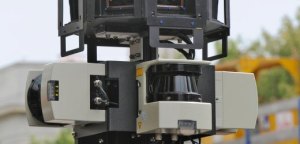 Germany’s consumer protection minister strongly criticized Google for a widespread privacy breach and insisted Saturday the U.S. Internet giant must cooperate better with data protection authorities.
Germany’s consumer protection minister strongly criticized Google for a widespread privacy breach and insisted Saturday the U.S. Internet giant must cooperate better with data protection authorities.
Google Inc. issued an apology Friday, acknowledging it has been vacuuming up fragments of people’s online activities broadcast over public Wi-Fi networks for the past four years while expanding a mapping feature called “Street View.”
Minister Ilse Aigner said the “alarming incident” showed that Google still lacks an understanding of the need for privacy.
“According to the information available to us so far, Google has for years penetrated private networks, apparently illegally,” her office said in a statement Saturday.
The ministry also accuses Google of withholding information requested by German regulators.
Only two weeks ago, Google was telling Germany’s consumer protection authorities that it was only recording the network’s names and addresses. Repeated questions about whether the company was gathering even more data remained unanswered, the statement said.
“Maintaining people’s trust is crucial to everything we do,” Alan Eustace, Google’s top engineering executive, wrote in a blog post. “We are acutely aware that we failed badly here.”
Google has characterized its collection of snippets from e-mails and Web surfing done on public Wi-Fi networks as a mistake and said it has taken steps to avoid a recurrence. The company said it only recently discovered the problem following the inquiry from German regulators.
“Street View” provides photographs of neighborhoods taken by Google cameras. The service has been enormously controversial in Germany and other countries as privacy groups and authorities fear that people — filmed without their consent — could be seen doing things they didn’t want to be seen doing or in places where they didn’t want to be seen.
The German ministry is now demanding that Google follow through on pledges to disclose its activities to data protection authorities in all countries.
“It also has to be disclosed to German data protection agencies which information is registered and how the illegitimately gathered data of unprotected wireless networks will be deleted,” Aigner’s ministry said.
Google gathered about 600 gigabytes of data from Wi-Fi networks in more than 30 countries, including the United States. Google plans to delete it all as soon as it gains clearance from government authorities. None of the information has appeared in Google’s search engine or on other services, according to Eustace.
The latest incident has prompted Google to abandon its effort to collect Wi-Fi network data.
In an apparent show of its commitment to privacy, Google also said it will introduce a new option next week that will let it users encrypt searches on its Web site as an added protection against unauthorized snooping.
Editors' Recommendations
- How to change theme colors in Google Slides
- How to delete a file from Google Drive on desktop and mobile
- The best resume templates for Google Docs
- 5 web browsers you should use instead of Google Chrome or Edge
- How to do hanging indent on Google Docs


